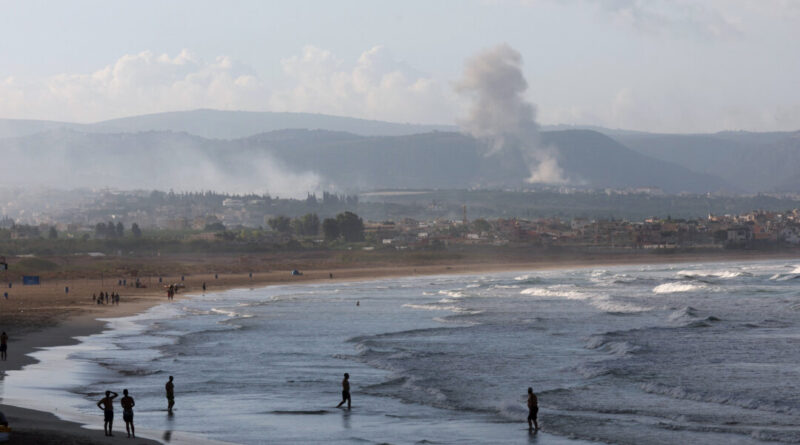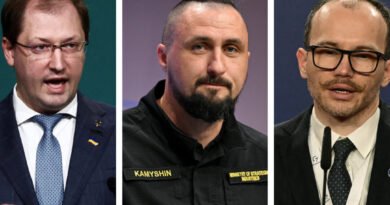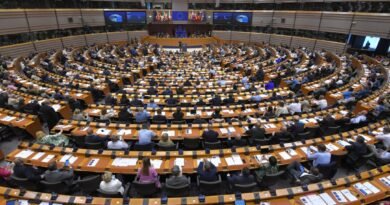Fear of Escalating Conflict as Hezbollah and Israel Exchange Fire
BEIRUT/HAIFA, Israel—Israel and the Hezbollah terrorist group exchanged fire early Sunday morning, with Israeli warplanes carrying out the most intense bombardment in almost a year of conflict across Lebanon’s south and Hezbollah firing rockets deep into northern Israel.
Israeli Defense Minister Yoav Gallant said strikes would continue until it was safe for evacuated people in the north to return—setting the stage for a larger conflict as Hezbollah has vowed to fight on until a cease-fire in the parallel Gaza war.
“In recent days we have inflicted a series of blows on Hezbollah that it never imagined,” Israeli Prime Minister Benjamin Netanyahu said in a video statement. “If Hezbollah has not understood the message, I promise you, it will understand the message.”
The conflict—which sharply escalated over the past week—has raged since Hezbollah opened a second front against Israel, saying it was acting in solidarity with Palestinians facing an Israeli offensive further south in Gaza.

Smoke rises from Jabal al-Rihan, amid ongoing cross-border hostilities between Hezbollah and Israeli forces, as pictured from Marjayoun, near the border with Israel, on Sept. 21, 2024.
Karamallah Daher/Reuters
The Israeli military said it struck around 290 targets on Saturday, including thousands of Hezbollah rocket launcher barrels, and that it would continue to hit more.
Israel closed schools, restricted gatherings in the north, and ordered hospitals there to move patients and staff to protected areas—many have secured or underground facilities designed to withstand rocket fire.
Air raid sirens sounded across northern Israel. About 150 rockets, cruise missiles, and drones were fired at Israel overnight and into Sunday, most of which were intercepted by air defenses, including an “aerial target” that came from the east, the military said.
Several buildings were struck, including a house badly damaged near the Israeli city of Haifa. Rescue teams treated wounded but there were no reports of deaths. Residents had been instructed to stay near bomb shelters and safe rooms.
Hezbollah said it hit a barracks and another Israeli position with squadrons of attack drones on Sunday.
It said it launched rockets at military-industrial facilities in an “initial response” to two days of attacks last week in which pagers and walkie-talkies used by its members exploded.
Those attacks, widely believed to have been carried out by Israel, killed 39 people and left more than 3,000 injured. Israel has neither confirmed nor denied involvement.
An official in the Islamic Resistance in Iraq, a grouping of Iran-backed armed factions, said they launched cruise missile and explosive drone attacks at Israel at dawn on Sunday as part of “a new phase in our support front” with Lebanon.
“Escalation in Lebanon means escalation from Iraq,” the official said.
The U.N. special coordinator in Lebanon, Jeanine Hennis-Plasscharet, said in a post on X that “with the region on the brink of an imminent catastrophe, it cannot be overstated enough: there is NO military solution that will make either side safer.”
Escalating Attacks
The escalating attacks come less than 48 hours after an Israeli airstrike targeting Hezbollah commanders in a suburb of the Lebanese capital. The death toll from that strike had risen to 45, the Lebanese health ministry said on Sunday.
Hezbollah said 16 members including senior leader Ibrahim Aqil and another commander, Ahmed Wahbi, were among those killed on Friday in the deadliest strike in nearly a year of conflict with Israel.
Israel’s army said it hit an underground gathering of Aqil and leaders of Hezbollah’s elite Radwan forces and had almost completely dismantled its military chain of command.
Israel wants Hezbollah to cease-fire and withdraw forces from the border region, adhering to a U.N. resolution signed with Israel in 2006, irrespective of any Gaza deal.
Tens of thousands of people have left their homes on both sides of the Israel–Lebanon border since Hezbollah began firing rockets at Israel in October in sympathy with the Hamas terrorist group in Gaza.
With at least 84 people killed in Lebanon over the past week, the conflict toll in the country since October has surpassed 750 during the worst Israel–Hezbollah flare-up since a 2006 war.
The Gaza conflict was triggered on Oct. 7 when Hamas attacked southern Israel, killing 1,200 people and taking about 250 hostages, according to Israeli tallies.
Israel’s subsequent assault on the enclave has killed more than 41,300 Palestinians, according to the Hamas-controlled local health ministry. The number does not distinguish between civilians and combatants.



